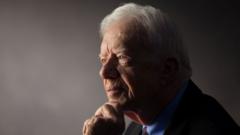Forty-four years have passed since Jimmy Carter left the presidency, yet the United States in 2024 finds itself confronting challenges that echo those of the late 1970s. Despite the chronological gulf, the central themes — economic unrest, geopolitical tensions, and a pervasive crisis of confidence — remain alarmingly similar.
In Carter’s time, the country was embroiled in domestic economic strain alongside escalating global challenges. From battling inflation to handling the fallout of the Iranian hostage crisis, the limitations of US power were stark. Fast forward to today, and President Joe Biden encounters analogous obstacles: inflation and its societal impacts, along with complex international dynamics in Ukraine and the Middle East.
Carter's diplomatic successes and failures provide a lens through which to examine Biden's current challenges. The Camp David Accords of 1978 showcased his diplomatic prowess, but subsequent events revealed the fragility of such agreements, particularly regarding Palestinian rights, an issue that has resurfaced sharply amid ongoing violence. Similarly, Biden's attempts to stabilize the situation in Gaza have been tested by expanding regional conflicts that he could not contain.
The specter of foreign conflicts also has domestic implications. In Carter's era, the energy crisis defined his presidency, while Biden faces the ever-intensifying landscape of climate change. Carter’s approach to energy conservation serves as a blueprint for Biden’s environmental initiatives, although the nearing calamity of climate change poses unprecedented challenges.
Public sentiment, too, presents a worrying parallel. Carter’s “crisis of confidence” speech in 1979 resonated with many who questioned the efficacy of their government. Today, Biden's presidency encounters similar distrust, reflecting a deep-rooted skepticism that has permeated American politics for decades.
The administration's struggles with maintaining public trust have frequently been exacerbated by Biden's relationship with an increasingly assertive China, a geopolitical nuance that Carter inadvertently set in motion. The normalization of relations between the US and China in the late 1970s has led to a complex rivalry, one that threatens to alter the global balance of power and requires careful navigation.
Both Carter and Biden's presidencies have shown that foreign policy crises can spill over into domestic affairs, leading to turmoil and discontent at home. As economic inflation rises and national confidence wanes, Biden reflects on the history of his predecessor.
Trump's criticism of Biden's capabilities often draws comparisons to the Carter administration, further embedding Carter's legacy in contemporary political discourse. Yet the reverberations of Carter’s post-presidential work highlight a dedication to humanitarian efforts, contrasting starkly with the post-presidency antics of Donald Trump.
In retrospect, Carter’s life demonstrates resilience even beyond the Oval Office. After leaving the presidency, he engaged in humanitarian efforts and won a Nobel Peace Prize for his lifelong dedication to human rights. Biden faces the daunting task of reshaping a public narrative that often mirrors Carter's struggle while continuing to make progress on domestic and international fronts.
Ultimately, as the nation watches President Biden grapple with issues encapsulated by Carter’s presidency, it becomes evident that history remains an invaluable reference point, illustrating that while times may change, fundamental challenges often persist.






















